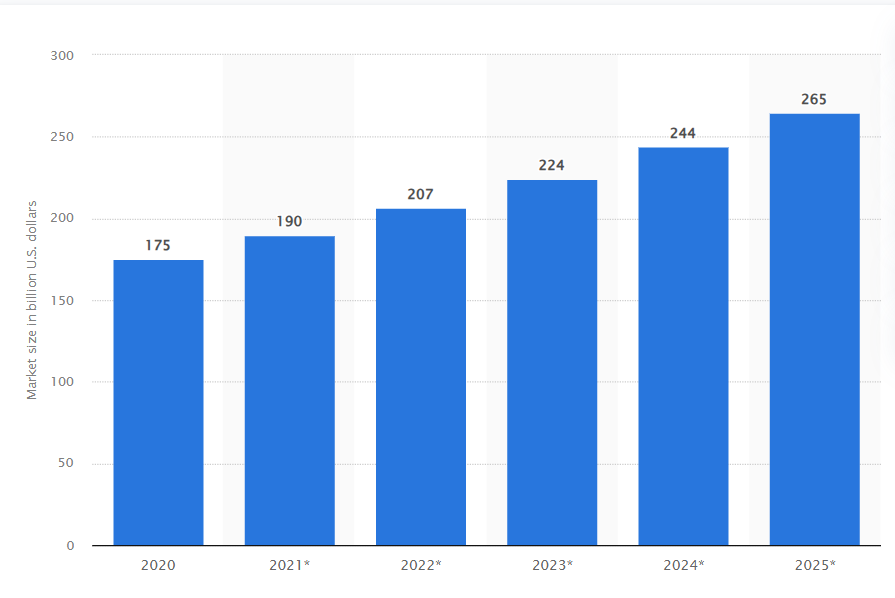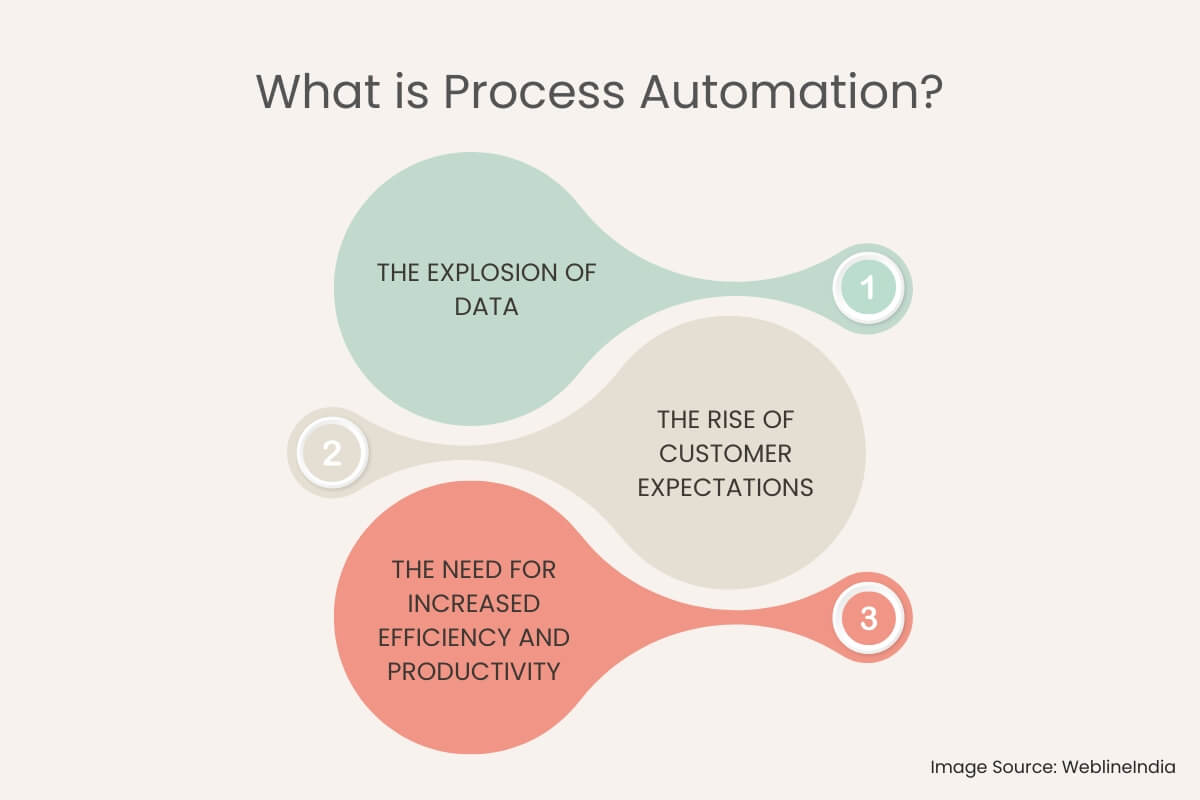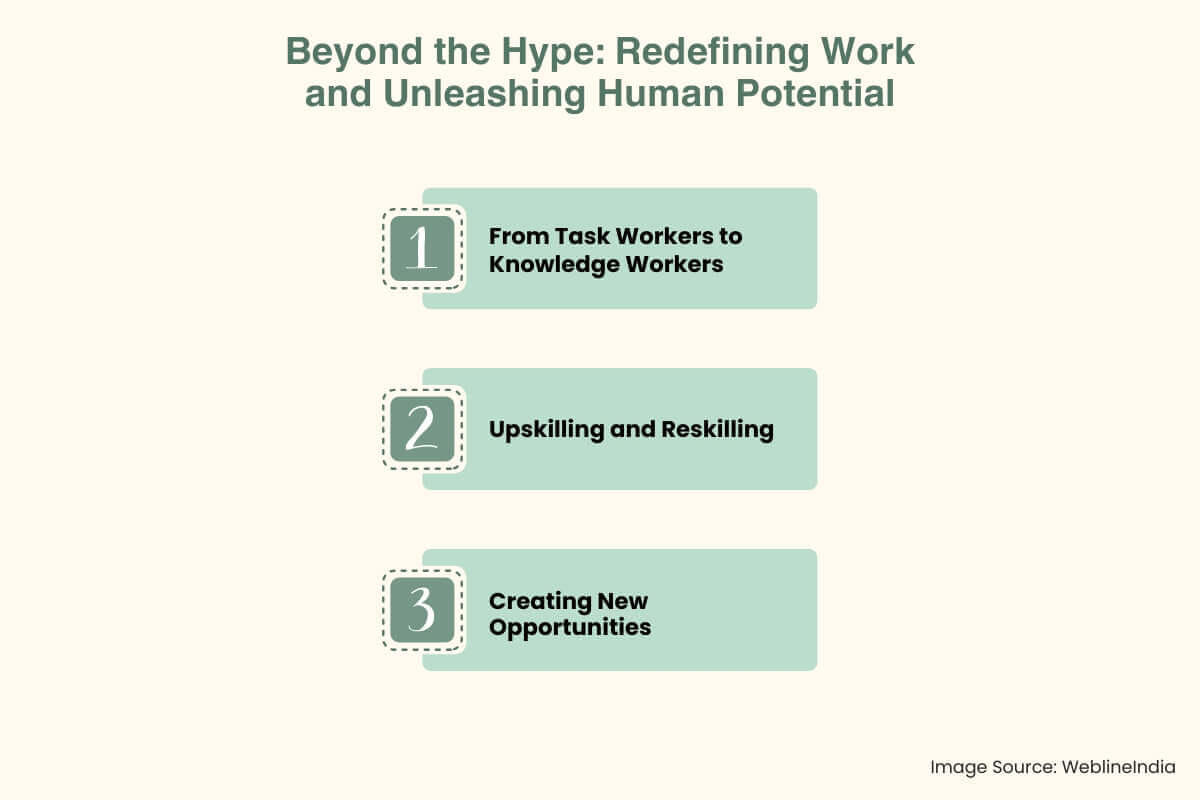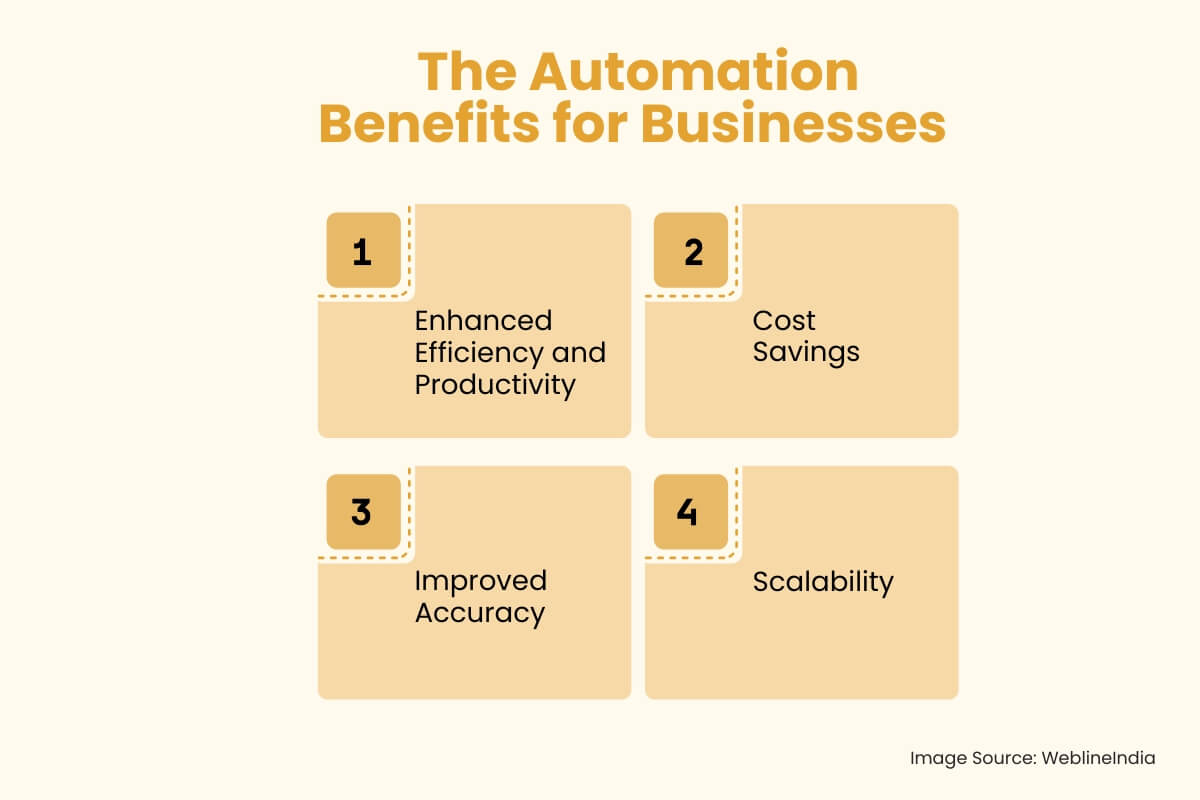Listen to the podcast :
The pace of technological advancements continues to accelerate, bringing new tools and solutions to industries across the globe. Among these, process automation has gained significant traction, revolutionizing how businesses operate.
In 2020, the global industrial automation market reached a considerable size of 175 billion U.S. dollars. Fueled by factors such as increasing demand for automation solutions across various industries and advancements in technologies like artificial intelligence and the Internet of Things (IoT), the market is projected to experience substantial growth in the coming years. Analysts predict a CAGR of approximately nine percent, leading to an estimated market size of 265 billion U.S. dollars by 2025.

Source: Statista on Industrial Process Automation Worldwide
Whether it’s the integration of robotic process automation (RPA) into daily operations or the broader concept of business process automation, many organizations are discovering the efficiency and productivity benefits of automating routine tasks. But the question remains: is process automation truly the future of business, or is it just a passing trend?
Looking to automate your business processes? Our experts can help.
In this blog, we’ll explore why process automation is more than just a trend and why it is set to be a key driver of business growth and efficiency.
What is Process Automation?
At its core, process automation refers to the use of technology to automate repetitive, manual tasks within business processes. This can involve a variety of technologies, from robotic process automation (RPA) to advanced AI and machine learning systems. RPA is particularly useful in automating rule-based, high-volume tasks such as data entry, invoicing, and customer service queries, allowing human workers to focus on higher-level decision-making.
The goal of business process automation is to improve efficiency, reduce errors, and ultimately cut costs across various departments. For example, process automation in finance, HR, and customer services has grown manifold in recent times.
While some may dismiss it as a passing fad, the reality is that process automation is rapidly transforming businesses across all sectors. This transformation is driven by several key factors:

The Explosion of Data
Businesses today generate massive amounts of data daily. Manual processing of this data is inefficient, time-consuming, and prone to errors. Process automation provides the tools and technologies to efficiently process, analyze, and leverage this data to gain valuable insights and make informed business decisions.
The Rise of Customer Expectations
In the digital age, customer expectations are constantly evolving. Customers demand faster service, personalized experiences, and 24/7 availability. Process automation empowers businesses to meet these demands by streamlining customer interactions, providing instant support, and delivering personalized experiences at scale.
The Need for Increased Efficiency and Productivity
In a competitive global market, businesses are constantly under pressure to improve efficiency, reduce costs, and increase productivity. Process automation provides the tools and technologies to streamline operations, eliminate bottlenecks, and optimize workflows, leading to significant improvements in efficiency and productivity.
Robotic Process Automation (RPA) – The Cornerstone of Process Automation
One of the key technologies driving process automation is robotic process automation (RPA). This technology allows businesses to automate repetitive tasks that are typically performed by humans, such as processing invoices or updating customer records. Unlike traditional software solutions, RPA mimics human interactions with applications but does so much faster and more accurately.
According to Grand View Research, the global robotic process automation (RPA) market is poised for explosive growth. Valued at USD 3.79 billion in 2024, it is projected to expand at an impressive compound annual growth rate (CAGR) of 43.9% from 2025 to 2030. This rapid growth is primarily driven by the increasing demand for operational efficiency and cost reduction across various industries. As businesses seek to streamline their operations, automate repetitive tasks, and enhance productivity, the adoption of RPA solutions is expected to accelerate significantly.
With RPA, businesses can:
- Improve operational efficiency by automating mundane tasks
- Enhance accuracy and reduce human errors
- Reduce operational costs by eliminating manual labor
- Provides 24/7 availability for processes that would typically require human attention
As RPA becomes increasingly advanced, it is expected to transform business process automation, bringing even more complex tasks under automation’s umbrella.
Want to see how automation can cut costs and boost efficiency?
Beyond the Hype: Redefining Work and Unleashing Human Potential
Process automation is not about replacing human workers; it’s about augmenting their capabilities and empowering them to focus on higher-value activities. By automating repetitive, mundane tasks, such as data entry, invoice processing, and customer service inquiries, businesses can free up their workforce to engage in more strategic, creative, and fulfilling work.

From Task Workers to Knowledge Workers
Process automation enables a shift from a workforce primarily focused on executing repetitive tasks to a workforce that can leverage its intellectual capital to drive innovation, solve complex problems, and enhance customer relationships.
Upskilling and Reskilling
As the role of automation increases, there will be a growing need for employees with new skills, such as data analysis, AI literacy, and process design. Businesses that invest in employee training and development programs will be best positioned to adapt to the changing workforce needs and cultivate a highly skilled and adaptable workforce.
Creating New Opportunities
Process automation can create new job roles and career paths. As businesses implement and manage automated systems, there will be a demand for skilled professionals in areas such as AI/ML engineering, data science, and process automation architecture.
The Automation Benefits for Businesses
The benefits of process automation are far-reaching and can have a profound impact on a business’s bottom line. Here are just a few of the key advantages:

1. Enhanced Efficiency and Productivity
Process automation helps businesses streamline operations, eliminating bottlenecks caused by manual tasks. By automating these processes, companies can speed up production, reduce wait times, and handle higher volumes of work in less time. This increase in productivity often results in greater output with the same resources.
2. Cost Savings
Reducing the need for human intervention in routine tasks lowers labor costs and frees up employees to focus on more strategic activities. These savings are particularly beneficial in industries where margins are tight and operational costs need to be minimized.
3. Improved Accuracy
Automating tasks reduces the chances of human error. Whether it’s entering data into systems or processing transactions, automation ensures that tasks are performed with consistent precision every time. This leads to more reliable outputs and minimizes costly mistakes.
4. Scalability
As your business grows, so do your processes. Business process automation allows organizations to scale their operations without the need for proportional increases in staff or resources. Automated systems can handle higher volumes of work without compromising on quality or performance.
Automation Best Practices for Successful Implementation
To maximize the benefits of process automation while overcoming potential challenges, businesses must follow automation best practices. Here are some key recommendations:
- Identify the Right Processes: Not every process is suited for automation. Start by automating routine, repetitive tasks that offer the highest return on investment.
- Start Small: Begin with a pilot project to test the effectiveness of automation in a specific department or process. This allows for a smoother transition and helps measure the impact before rolling out on a larger scale.
- Ensure Proper Training: It’s vital to train employees on how to use the new automated systems. This ensures they can operate them effectively and embrace the new technology rather than resist it.
- Monitor and Optimize: Automation is not a set-it-and-forget-it solution. Regularly monitor performance and optimize processes to ensure the system continues to meet evolving business needs.
The Long-Term Impact of Business Process Automation on Companies
As businesses continue to embrace process automation, the impact on long-term growth and innovation will be profound. Automation not only enhances day-to-day operations but also opens up new possibilities for scaling businesses and introducing innovative products and services. With systems in place to handle routine tasks, employees can focus on higher-value work, such as problem-solving, strategy development, and customer relationships.
Wrapping up: Process Automation is Here to Stay
The rise of process automation—driven by technologies like robotic process automation (RPA)—has already proven to be a game-changer for businesses of all sizes. The many automation benefits, from improved efficiency to reduced costs, demonstrate that automation is far more than just a passing trend. While there are automation challenges to consider, these can be mitigated through careful planning, the adoption of automation best practices, and a commitment to continuous improvement.
Process automation is not a fad; it’s a necessary evolution for businesses that want to remain competitive in an increasingly digital and fast-paced environment. With WeblineIndia’s flagship agentic process automation, the future of business will undoubtedly involve greater automation. We offer companies the tools they need to stay ahead of the curve and achieve sustainable growth.
Social Hashtags
#ProcessAutomation #BusinessGrowth #Automation #RPA #DigitalTransformation #AI #TechInnovation #FutureOfWork #Efficiency #BusinessAutomation
Is your business ready for the automation revolution with the knowledge of industry experts?
Frequently Asked Questions
Testimonials: Hear It Straight From Our Customers
Our development processes delivers dynamic solutions to tackle business challenges, optimize costs, and drive digital transformation. Expert-backed solutions enhance client retention and online presence, with proven success stories highlighting real-world problem-solving through innovative applications. Our esteemed clients just experienced it.










